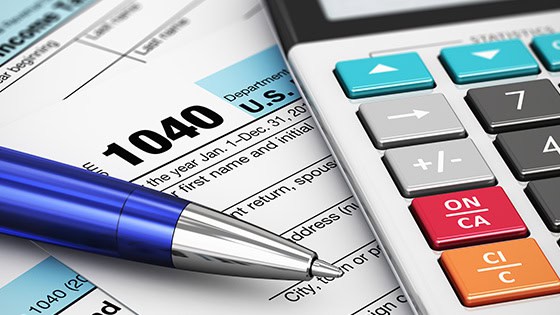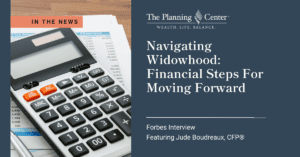
By Caleb Arringdale,Tax Advisor
Probably the biggest reason people get stressed about doing their taxes is because they haven’t kept good records during the year. Nobody wants to be scrambling to find receipts in April, and yet so many people do. Good recordkeeping isn’t hard, it just takes a little forethought, and the result are well worth it. Here’s a brief summary of what documents you’re most likely to need for your personal taxes:
- Recordkeeping for Standard Deduction
The Tax Cuts and Jobs Act (TCJA) raised the standard deduction in 2017, as a result, most people now file their taxes this way. The beauty of the standard deduction is that you’re not itemizing so you don’t need to keep as many records, but you will need various tax forms to report your income. Which forms will depend on where your income comes from.
a. W-2 Form for Employee Income
This form summarizes all wages paid to an employee during the tax year. Employers are responsible for filing W-2s and are required to send a copy to employees by the end of January.
b. Form 1099 – Non-employee Income
This form provides information about different types of non-employment income received during the tax year. Because there are many different ways of earning income, there are many different 1099 forms. Here are some of the most common types of 1099 forms:
- 1099 NEC– Freelance or contract worker receive this form from any organization who paid them $600 or more during the tax year.
- 1099 INT – Financial institutions send this form to anyone who received more than $10 in interest during the year.
- 1099 DIV – Anyone who owns stock or other securities and received $10 or more in dividends and distributions receives this form.
- 1099 MISC – This form reports certain types of miscellaneous income including rent, royalties, prizes, awards, and healthcare payments.
- 1099 R – When someone gets a distribution from a retirement plan, such as an IRS, Roth IRA, 401(k) plan, they receive this form.
c. Receive Forms by Mail or Electronically
The default is for hard copies of the forms to arrive by mail, but you do have the option to receive them electronically. You just need to give consent to the organization that will be filing the forms. Either way, the forms must be sent to you by January 31. For most people using the standard deduction, they can go ahead and file their taxes once they have these forms.
- Personal Tax Filing – Itemizing
If your deductions will exceed the standard deductions, you should itemize by filing a Schedule A with your 1040 tax form. To keep good records, organize your receipts by category. Two of the most common categories of deductions are charitable and medical, so let’s look at the kind of records you’ll need for those:
a. Recordkeeping for Charitable Giving
To qualify for deductions, gifts must be made to a tax-exempt 501(c)(3) organization, and the required documentation will vary based on the nature of your gift. To keep track, you may want to organize your files by how you give, as described below.
- Donating Money –The organization should send a letter or acknowledgment of the dollar amount which you should keep for your taxes. Other qualifying documentation includes a bank statement, a credit card statement, or a cancelled check.
- Donating Household Items – If your donations are valued under $500, you don’t need documentation. If you claim deductions over $500, you’ll need to provide a list of the items, the value, where you made the donation, and when.
- Donating Big-Ticket Items – When you donate large items, such as a car or a boat, you should get it appraised first to establish its value. If the organization sells the item, they will send a letter stating what they sold it for – that’s your deduction.
- Donor Advised Fund – When you contribute cash, securities, or other assets to a donor-advised fund, you are generally eligible to take an immediate tax deduction. Donors receive tax receipts when they make contributions to donor-advised funds.
- Donating Stock –The organization will send a letter specifying the value of your gift, which is the amount you can deduct.
b. Medical and Health Care Deductions
Here are some of the health-related costs you may be eligible to deduct:
- Premiums for medical, dental, long-term care, vision, Medicare Part B, and Medicare Part D insurance that you are not reimbursed for and that are not paid using pretax dollars.
- Co-pays for medical, dental, or vision care.
- Nursing care, hospital stays, programs to help you stop smoking, and weight-loss programs for the treatment of obesity or another condition diagnosed by a doctor.
- Acupuncture, chiropractic services, podiatrists, sessions with a psychiatrist or psychologist, and occupational and physical therapy
c. Tax Records for Medical Deductions
If you’re deducting medical expenses, expect to track a lot of paperwork. For this category, consider subfolders organized either by month or by care provider. Whichever approach you take, here are the records you’ll need:
- Name and address of each person or entity you paid.
- Amount and date of each payment.
- Statement or itemized invoice showing:
- What medical care was received,
- Who received the care,
- The nature and purpose of any medical expenses,
- The $ amount of the medical expenses
Start Keeping Good Records Today
Storing records and receipts doesn’t need to be complicated. One of the keys to success is to file paperwork as soon as you receive it. If you tend to lose hard copies, the IRS will accept digital receipts for tax purposes. Capture records immediately by taking a photo of them with your smartphone, then set up a filing system on your computer. Just be sure you back everything up.
The best time to start keeping good records is right now. If you have questions about how to reduce your tax liabilities, contact The Planning Center. We are dedicated fiduciaries who offer integrated tax planning designed to help you build wealth and achieve your financial goals.
 Caleb Arringdale is a Tax Advisor in the Quad Cities office of The Planning Center, a fee-only financial planning and wealth management firm.
Caleb Arringdale is a Tax Advisor in the Quad Cities office of The Planning Center, a fee-only financial planning and wealth management firm.
Please email Caleb at: caleb@theplanningcenter.com.





